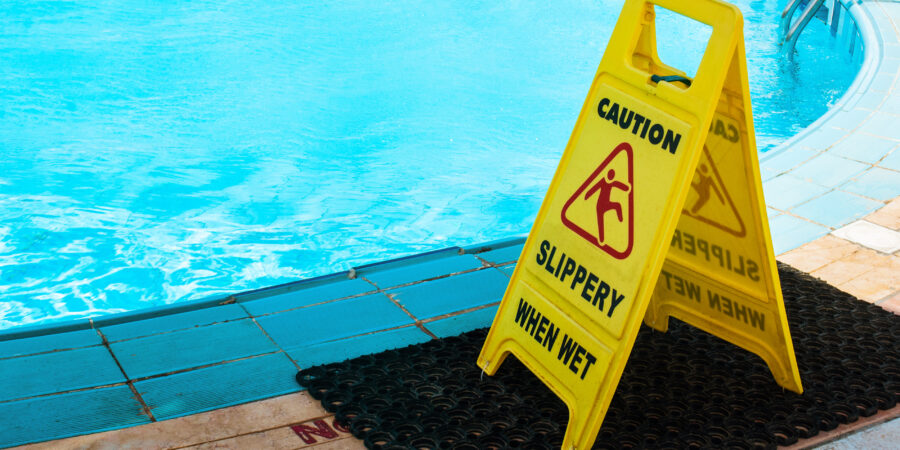Dealing with Pool Injuries
When summer arrives, you can be assured that people will spend a lot of time at the pool. Although they are highly refreshing on hot summer days, pools can also be extremely dangerous. That’s why pool owners have the duty to be very cautious because they must make sure that their guests are safe in their pools. Sadly, this doesn’t always occur, and when they fail to live up to their responsibilities, you need someone to hold them accountable for the injuries that their lack of care caused.
Several injuries often occur at a pool, including the following:
- Drowning
- A neck injury, spine injury or brain injury
- Bone fractures
- Torn ligaments
- Lacerations
- Concussions
What Are the Causes of These Injuries?
According to the CDC, drowning is the fifth cause of unintentional death in the United States, and there are several reasons for this, including the following:
- Seizure disorders
- The consumption of alcohol
- The lack of life jackets
- The lack of supervision
- The lack of fences to prevent unattended swimmers
- The location of the pool
- The inability to swim
How Can You Prevent Injuries?
First, ensure that everyone learns how to swim. Then, pool owners and operators can ensure that someone is watching at all times when people are swimming. All drains must be covered so that the suction cannot grab hold of someone’s hair or bathing suit and force them underneath the water. Lastly, take a course in CPR so that you can administer CPR if you find someone drowning at a pool.
When Can the Community/City Be Found Liable for a Pool Injury?
The community can be held liable if the owner fails to warn swimmers that the water is not deep enough for people to dive. The pool may also have obstructions that are not in plain view. If the owner fails to inform guests that these obstructions exist, the owner can be determined to be negligent.
The owner of a pool in a hotel or a club has additional concerns. For example, these pool owners have the obligation to have emergency safety equipment for their guests. If they do not, they may be found negligent in a personal injury claim. These pool owners must also ensure that their equipment is in good condition. For example, they may have drains, diving boards or ladders that must not be allowed to fall into a state of disrepair. If they do, these owners must warn their patrons about these dangers. Lastly, public pools are required to have lifeguards on the premises.
How Do You Go About Submitting a Personal Injury Claim for a Pool Injury?
In the event that you are injured at a public or private pool, you must take the following steps so that you can file a claim for your personal injury:
Dial 9-1-1 for a Very Serious Injury.
In many cases, injuries that occur at pools can cause the person to experience incredible pain, and they can also be hazardous to the person’s health. By calling 9-1-1, you can ensure that the victim receives medical attention as quickly as possible. Calling 9-1-1 also means that a police officer will arrive at the scene, so the officer will write a report that describes your injuries.
Go to the Emergency Room.
You will either need to go to the emergency room or to your doctor right away. Then, medical personnel can treat your injuries at the earliest convenience. This is important because your injuries can get worse if you fail to get medical attention in a timely manner. The medical personnel will also create a report that will state that your injuries occurred while you were at a pool.
Record the Scene of the Accident.
Make sure to take photographs of the pool, the equipment and the area around the pool. Pictures will make it easier for others to see how the accident could have happened and why it occurred. They may also demonstrate how the pool’s operator or owner is responsible for the accident.
Contact a Personal Injury Lawyer.
You must contact a personal injury lawyer as soon as possible. When someone is injured in a swimming pool, the evidence tends to disappear quickly. Owners or operators of pools have also been known to make repairs after an accident has occurred. If they are able to do this, it will be difficult for you to prove that a faulty or damaged piece of equipment is the cause of your injuries.
Don’t Say that You Are at Fault, and Don’t Give Updates on Your Social Media Pages.
When someone files a personal injury claim, the negligent party and that person’s insurance company will resist the possibility of offering you a fair settlement for your injuries. If you state that you are at fault or you suggest that you may be partially to blame, the at-fault party will use these statements against you during the negotiations or in court. If you discuss the case on your social media pages, anything that you write may be used to justify denying you the amount of money that you deserve.
What Is Premises Liability?
A claim filed against a pool owner will be filed as a premises liability case. Premises liability refers to a piece of land, a building or other premises where an injury takes place. It recognizes three types of “entrants” to the premises. These entrants are those who have been invited, those who are licensees and those who are trespassers. The owners of the premises owe each type of entrant a different level of care. In the case of a pool owner, the pool owner’s responsibility is to ensure that the pool is reasonably safe for visitors.
When someone pays to enter a public pool or enters without having to pay a fee, this person is known as an “invitee.” The pool owner is required to do a reasonable job when maintaining or repairing the pool so that the invitees will not be injured.
When someone is a trespasser on someone else’s property, the owner does not owe this person a duty of care. If the trespasser happens to be a child, this rule does not necessarily apply.
Duty of Care for Child Trespassers.
Pool owners do owe a duty of care to children according to the attractive nuisance doctrine. They must ensure that the pool is safe for young children because children do not understand that there is a possibility of drowning in a pool. They must ensure that young children do not have access to their pools, so this could mean that they place a fence around the pool with a locked gate.
Personal Liability.
The time when premises liability will not apply to a pool owner is when the injury resulted from the negligent or intentional actions that the at-fault party took. For example, the at-fault party jumped into the pool without making sure that no one was in his path. He landed on the guest and caused injuries. In this case, the injured party would be able to sue the negligent party. The injured party would be able to sue for negligence and standard intentional tort rules as well as comparative and contributory negligence.
Obtaining Monetary Compensation.
If you are able to follow the steps for what you should do after being injured at a pool, your attorney will be able to do the following:
- Gather evidence that demonstrates that your injuries were caused by conditions at the pool.
- Your attorney will determine what type of pool you were visiting when your injuries occurred. Then, they will be able to determine the level of the owner’s or the operator’s duty of care to you.
- Your attorney must also determine whether you were an invitee, licensee or a trespasser.
- Your attorney will calculate an amount of money based on your lost wages, medical bills, and pain and suffering for the injuries sustained at the pool.
- Lastly, your attorneys will draw up a demand letter that will inform the at-fault party of what they consider to be a fair settlement. They will use their vast experience for negotiating settlements for their clients to negotiate full compensation for you.
Pursuing Compensation for Wrongful Death or Severe Injuries.
If a loved one died or was injured while at a pool, you have the right to file a claim against the guilty party for monetary compensation for the injuries. In most cases, you will be entitled to receive the following damages:
- The loss of the deceased person’s income
- Lost wages
- Payment of medical bills and other costs
- Payment of other bills related to the injury
- The loss of the joy in life
- Pain and suffering for emotional and physical injuries
If you or a loved one were injured at a pool due to someone else’s negligence, contact us at JTLegalGroup. Our attorneys have 85+ years of experience combined. You must not wait to hire an attorney because the statute of limitations is approaching, and if you fail to file a claim by the time the statute of limitations passes, you will not be able to hold the at-fault party accountable for your injuries. Premises liability is one of our specialties, so contact us today.


